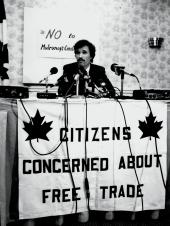
CCAFT is a national, non-partisan group dedicated to fighting what it regards as the threat to Canadian sovereignty posed by international trade agreements such as the Canada-United States Free Trade Agreement (FTA), the North American Free Trade Agreement (NAFTA), and the proposed Multilateral Agreement on Investment (MAI). CCAFT was founded in 1985, shortly after Canada and the United States agreed to begin negotiations to attempt to achieve a bilateral free-trade agreement. It was created by a small group of activists including David Orchard, a farmer from Borden, Saskatchewan, who became its president, and Marjaleena Repo, a native of Finland with a history of involvement in political organizing and activism, who became its chief organizer. The group held its first public meeting in Saskatoon, at the Frances Morrison Library, on December 12, 1985. By late 1988 it was reported to have around 3,000 members, though Orchard has asserted that the actual number was closer to 10,000. Whatever the case, if CCAFT was not the largest anti-free-trade group operating in Canada during the late 1980s - a distinction that would have to go to the national organization then known as the Pro-Canada Network (PCN) - it was among the most visible, with active branches across the country in cities such as Vancouver, Edmonton, Winnipeg and Thunder Bay.
In December 1987 it successfully organized one of the largest public meetings on free trade in Saskatchewan, a debate between Orchard and Bob Andrew, the Saskatchewan Minister of Economic Development, which attracted some 1,500 people to the Centennial Auditorium in Saskatoon. CCAFT members also attracted national media attention when several of them were charged in cities across Canada under municipal bylaws prohibiting the posting of notices on city property, such as telephone and hydroelectric utility poles. Although many were convicted, two members charged in Toronto were acquitted, a decision upheld by the Ontario Court of Appeal in a 1994 ruling stating that such bylaws were “disproportionately invasive” of the right to freedom of expression as guaranteed under the Charter of Rights and Freedoms. This reinforced a ruling by the Supreme Court of Canada in a similar case in 1993, thus establishing a further precedent for the “right to poster.” CCAFT maintains its headquarters in Saskatoon, and estimates that it currently has an active membership base of about 20,000 people.
Tim Krywulak